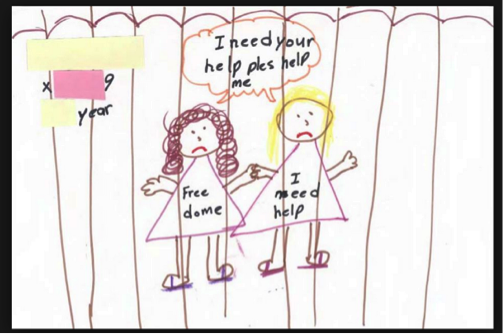
Kabul to Kafka: Inside Australia's Community Detention Program (4ZZZ, Brisbane)
By Anna Carlson
"Hello, child,
Welcome to Australia. Here are some things you'll need during your time with us.
First, here's your boat ID number. This is so that everyone knows that you don't deserve a name. Also, yours is too hard for us to say. Next, here's your gag clause. You must keep it on at all times. If we find out that you've taken it off, we'll send you back to detention. And finally, here's your future. We've wrapped it up nice and tightly so that we can be sure that you don't open it until we tell you to. If we find out that you've tried to open it, we'll take it off you for good.
Now, while you're in Australia, you must obey all directions from an authorised person. Who's an authorised person? I'm sorry, we are not authorised to give you that information at this time.
Please wait patiently while your claim is assessed.
Look, a pencil! Would you like a pencil? You could use it to draw a picture to put up in your cage. That'll make you feel better.
What's that? You'd like to know how long you'll have to stay here?
Sorry, Boat ID 714661X, we are not authorised to provide an exit date. It might give you too much hope..."


Bureaucracy, boredom and the invisible cage
In July 2015, 857 children were in immigration detention in Australia. Of those 857 children, 642 live in the community, under a program called "Community Detention." They are the "lucky" ones.
Kabul to Kafka: Inside Australia's Community Detention program takes an inside look at what life is like for children and young adults who arrive in Australia alone. Through a collection of interviews with youth workers, caseworkers, project officers, counsellors and advocates, I look to the mundane, the everyday, to try to understand what it feels like to be a "UAM" - unaccompanied minor - in Australia.
Right at the core of the project, however, lies a gap. When I started thinking about Kabul to Kafka, I had spoken to a number of young people who had lived in community detention and who were keen to share their stories. Once I explained the possible consequences of speaking to the media, however, almost all of my participants withdrew their consent. As a former youth worker and current community educator in Brisbane's refugee and asylum seeker communities, I was pretty unwilling to push these vulnerable and marginalised young people into a position of heightened anxiety. And so instead of direct interviews, I asked everyone I knew, to ask everyone they knew, to find stories and anecdotes from refugees and asylum seekers in community detention. These submissions make up the backbone of this documentary. They are the reason I made this work. And they are powerful. They allow us to feel, just for a moment, some of the intensity that comes of growing up in a new country, in a new city, surrounded by strangers, under the watchful gaze of the Minister for Immigration and Border Protection - the legal guardian and chief protector of young asylum seekers.
If you feel like you’d like to speak to someone after listening to this documentary, call Lifeline on 13 11 14. They offer counselling and assistance, for free, to anyone who calls. They are a wonderful service. If this has motivated you to do something about Australia’s treatment of refugees and asylum seekers, join your local branch of the Refugee Action Collective, or contact any one of the numerous social and political organisations dedicated to softening the blow of Australia’s policies. And if you’d like any more information about this particular project, please contact Anna Carlson via Brisbane community radio station 4ZZZ.
Pictured top left: Drawing by a child on Christmas Island, via Australian Human Rights Commission
Facebook comments